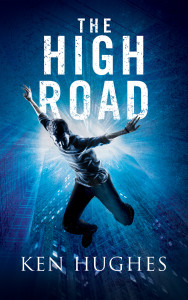When The High Road started on a Tower – a Deleted Opening Scene

Can an opening scene be too… distinctive?
There’s a line writers love to quote, that when a piece of writing doesn’t work we need to “kill our darlings.” (Or “murder” them; either way there needs to be blood.) It’s good advice, even when the darling is a scene of a madman ready to crush steel at hundreds of feet above street level, and other strange and delightful moments that don’t go quietly when the executioner’s editor’s pen comes around.
I admit, when I started writing The High Road it seemed like the ideal beginning. I’ve always trusted that the further I can push my characters, hero and villain, the more I can sweep a reader along. So what could be better than to drop people into the viewpoint of a creature just sane enough to understand, who’s looking down on what seems to be an innocent person below that might be attacked just for being there… then skip back in time to a simple father and child on very different sides of the mystery that would lead up to that, and do it all in an enigmatic two pages?
Ahh, the arrogance of a new idea. The sad truth I’ve come to realize is that opening a new book series with two slices outside of the regular narrative is too likely to come across as a gimmick, especially when they’re so hard to orient to. And even the “simpler” piece of the puzzle wasn’t properly on-target, since it only hinted at the starting incident that it was there to explain. It also short-changed the magic that I wanted to hint at—and worst of all it showed Mark with Angie’s father rather than Angie herself…
Thanks to the help of friends (starting with the Greater Los Angeles Writers Society), bloggers, and editors, I’ve accepted that that wasn’t good enough. The opening you’ll be able to see this fall is more approachable, and closer to the heart of what the story’s about.
Still, I think the crazier version deserves a chance to be seen… and better yet, heard, thanks to the versatile voice of Mr. John W. Riddle.
So, lean back and prepare to close your eyes for three and a half unique minutes, or read along on the scene that follows. Picture a driven, barely rational creature clinging upside down to a skyscraper radio antenna, and then a boy visiting a friend’s father. In the original plan, you’d spend half the book wondering what the connection between them is.
(PS: the creature watching the sunrise would have been the hero, the same as the boy. Not that that’s true any more; I’ve found other things to put Mark through instead.)
And now:
Why doesn’t the sky burn any more?
Hands clinging tight on the steel, gazing up past it to emptiness… loll the head back to look out across the endless city, lattices and streets of scattered lights against the black. Wind whips at the coat, but deeper forces curl pulsing through the horizon. It should all be ours, but instead…
Wings beat, flying not close by, the feet shift on the metal above. Birds… what do birds mean…
Instead, the memory:
“Don’t turn your back on the greedy… they never stop…”
“Don’t trust yourself…”
Cling tighter as footsteps move below, a man walking and waving light around. Alive in the city, when he didn’t deserve to be.
Heavier, grip shifting to hold on. Or the power could shatter, could sweep away hope–
The man turns inside, the space below stills. Across the lake, a new light hints at dawn. But the words failed, there is no escape, and hands clench coldness as if they could do more.
Again, the voice, from a ghost. All meaningless, ever since–
The knock on the door.
The father opened it, still in his police uniform. The boy only came up to the lower buttons on his shirt.
“Sorry for coming out here,” the boy said, his voice shaking a little. “But nobody answered, and she–”
“At this hour?” the father snapped, and the first syllables echoed down the silent hall before he caught himself. “You know what you’re putting your parents through?”
“Uh… I’m sorry. It’s just, the way my uncle and aunt were fighting I didn’t think they’d notice–”
“You call them right now, and then go home! Now!”
“Sorry. But… she was just playing safari with me, why did you drag her–” The boy broke off as the father’s hand tightened on the door frame, knuckles going white.
But instead of shouting, he let go of the door, and his voice softened. “I guess you mean well. But… just go home, and stay safe. Everything’s going to be alright.”
“Can I see her–”
“Home!”
He glared over and the boy looked around, to see a man peeping around the door from the next apartment.
The father said nothing more, only pulled back inside.
When he did that, the boy walked over to the neighbor. “Listen… do you know why he’s so mad?”
“You don’t know?” The neighbor kept his voice in a hush. “His daughter tried running away. He wouldn’t let us help, he just brought her back himself. Is she alright?”
“He… he said so,” the boy managed, eyes wide. “Ran away, really?”
“Really. Did she try to go to her mother’s? He didn’t want us to call–”
The neighbor stopped short then, looking over at the father’s door. He was still watching them.
The boy muttered “Thanks,” and hurried away down the corridor.
And yet, just as the boy was stepping off the street into the apartment complex next door, he spun around and took a step toward where the father was stepping outside himself–out of uniform now, and moving quietly into the dimness of the night.
After a few more steps, the boy lost sight of him.
